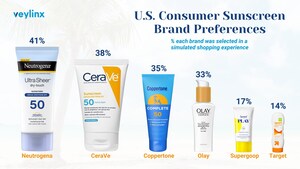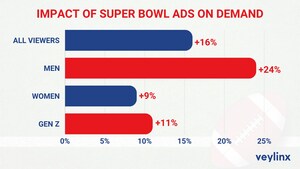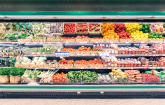Inflation Nation: How Much Are People Willing to Pay for Cereal?
New Research Shows Consumers Are Willing to Absorb Price Increases
NEW YORK, Jan. 4, 2022 /PRNewswire/ -- Veylinx, a consumer insights platform that uses behavioral research to predict purchasing habits, studied the impact of price increases on demand for the two most popular U.S. cereal brands, Cheerios and Frosted Flakes. According to the findings, 84% of consumers are concerned about the impact of inflation on their daily lives—but despite these worries, they are willing to absorb rising prices when it comes to cereal. Relatively small price increases have little effect on demand for these breakfast staples.
For example, the study found that when prices rise by 20 cents (from $3.29 to $3.49), demand for Frosted Flakes is virtually unchanged and demand for Cheerios drops by only 1.5%. Larger price increases do have a more significant effect on demand: a 50-cent price increase reduces demand for both brands by almost 13%.
People who eat cereal more than twice a week are more tolerant of price increases. Their demand falls by only 15% when the average price goes all the way from $3.29 to $3.99 (a 21% increase). At this price change, demand drops by 26% for people who consume two or fewer bowls per week.
When it comes to price, $3.99 appears to be an important psychological threshold, with demand falling sharply above that point; demand decreases dramatically again at $4.99. With that, men are nearly twice as willing to absorb price increases as women. Surprisingly, though older consumers (55+) express the most worry about inflation—with 89% somewhat or very concerned—they are just as likely to absorb price increases as younger consumers. Gen Z consumers are the least worried about inflation (only 71% concerned), which is also reflected in their greater willingness to tolerate rising cereal prices.
Counterintuitively, lower income consumers (<$25K annually) are least worried about inflation (78%) while consumers with $100K+ in annual income report being most worried, with 88% somewhat or very concerned.
In addition to inflation, more than 60% of consumers worry about supply chain disruptions.
An additional finding enabled by Veylinx's proprietary behavioral methodology revealed that consumers consistently overstate their interest and the amount they are willing to pay in traditional surveys versus real purchasing situations. For example, 76% of consumers said they would purchase Frosted Flakes in a resealable bag when surveyed, but when faced with an actual purchase decision, only 39% did.
"Consumer goods companies are under tremendous pressure to offset rising costs by raising prices," said Anouar El Haji, CEO of Veylinx. "However, they can't rely on historical data or traditional methods to accurately predict what consumers are willing to pay. The current situation requires a new way of measuring demand for both existing products and innovations. This cereal study shows how important it is to use real behavioral insights to update prices and positioning while identifying which innovations to launch under these inflationary circumstances."
The Veylinx study also looked at purchase interest for a range of potential packaging innovations (sustainable packaging, single serve pouches, resealable packages, and multipacks) to see if they provide opportunities for brands to raise prices without reducing consumer demand. The study found that most of these innovations did not drive higher demand than the standard Cheerios and Frosted Flakes boxes, regardless of the price point.
For Cheerios, sustainable packaging showed the most promise, performing the best at higher price points than the other innovations tested. For Frosted Flakes, single serve pouches drove the greatest demand of those innovations.
For more information about the study and the Veylinx methodology, visit info.veylinx.com/inflation-cereal.
About the research
Veylinx studied the behavior of 6,410 U.S. consumers to reveal their demand for breakfast cereal. Unlike typical market research, the study used Veylinx's unique methodology to measure actual consumer purchase behavior instead of intent. Participants placed a single sealed bid using their own real money on the products being tested. Participants next answered a series of follow-up questions about their preferences, perceptions and purchase behavior. The results reveal consumers' true willingness to pay instead of their hypothetical willingness to pay, providing an accurate and deep understanding of demand.
About Veylinx
Veylinx is the most realistic behavioral insights platform for confidently answering critical business questions during all stages of product innovation. To reliably predict demand, Veylinx captures insights through a Nobel Prize-winning approach in which consumers have real skin in the game. This is a major advance from traditional market research practices that rely on what consumers say they would hypothetically buy. Veylinx's unique research methodology is trusted by the world's most innovative consumer goods companies, including P&G, Unilever, Pepsico, Nestlé, General Mills, Reckitt and Kimberly-Clark. www.veylinx.com
Press Contact:
Rachel McAllister
[email protected]
+1 661-917-7419
SOURCE Veylinx

WANT YOUR COMPANY'S NEWS FEATURED ON PRNEWSWIRE.COM?
Newsrooms &
Influencers
Digital Media
Outlets
Journalists
Opted In






Share this article